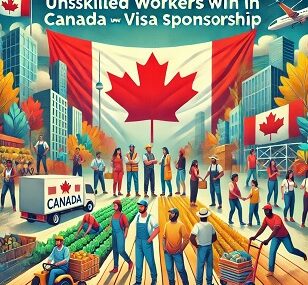Australia is one of the most sought-after destinations for skilled workers worldwide. With its high standard of living, world-class education, and abundant job opportunities, it’s no wonder that many dream of building a career there. However, navigating the process of securing a job with visa sponsorship can be challenging.
What is a Visa Sponsorship Job?
Visa sponsorship jobs are roles offered by companies willing to support and assist non-residents in obtaining a work visa to live and work in Australia. When a company sponsors a visa, it signifies that they are committed to bringing an international candidate onboard, filling skills gaps within their organization that may not be readily met by local talent.
Companies that sponsor visas must be registered and approved by the Australian government to hire foreign workers under different visa categories.
Who Can Apply for Visa Sponsorship Jobs in Australia?
Most visa sponsorship jobs in Australia are available to highly skilled professionals with qualifications, certifications, or extensive experience. Specific visas, such as the Temporary Skill Shortage (TSS) visa, are commonly used to bring in workers for roles on the Skilled Occupation List (SOL) of Australia.
Some of the qualifications to apply for a visa sponsorship job in Australia include:
- Relevant Work Experience: Typically, companies prefer applicants with substantial experience in their respective fields.
- Educational Qualifications: A degree or diploma in a relevant field may be required, depending on the job type.
- Language Proficiency: A strong command of English is essential, often proven through IELTS or similar tests.
- Clearance and Health Checks: Many roles require police clearance and medical checks.
Top Industries in Australia Offering Visa Sponsorship Jobs
While multiple industries in Australia offer visa sponsorship, certain sectors have a higher demand for international professionals due to skills shortages.
- Healthcare and Medical: Australia faces ongoing shortages of healthcare professionals, including doctors, nurses, and allied health workers. Hospitals and clinics regularly seek qualified international candidates.
- Engineering: Skilled engineers across civil, mechanical, electrical, and mining engineering are in high demand.
- Information Technology (IT): Australia’s booming tech industry requires software developers, cybersecurity experts, and data scientists.
- Construction: The construction industry continues to grow, with ongoing demand for civil and structural engineers, project managers, and skilled trades.
- Agriculture and Farming: Many rural areas in Australia need farm managers, agricultural scientists, and other skilled agricultural workers.
How to Apply for Visa Sponsorship Jobs in Australia
- Identify the Right Visa: Choose a visa category that aligns with your skills and career goals. The TSS visa is popular for skilled workers, but other options include the Employer Nomination Scheme (ENS) visa or the Skilled Independent visa.
- Research Companies Sponsoring Visas: Use job boards, LinkedIn, and recruitment agencies to identify companies in Australia that commonly sponsor work visas.
- Tailor Your Resume and Cover Letter: Highlight your skills and experience that match the job requirements, emphasizing any experience with international or English-speaking environments.
- Apply Through Official Job Portals: Sites like SEEK, LinkedIn, and Indeed often list jobs with sponsorship opportunities. Additionally, government portals like the Australian Department of Home Affairs website can offer direct information.
- Prepare for Interviews: Be ready to discuss your qualifications, language proficiency, and why you are an ideal candidate for the role in Australia.
FAQs
What are Visa Sponsorship Jobs?
Visa sponsorship jobs are roles where a company supports a foreign worker’s visa application to live and work in Australia. The company essentially “sponsors” the worker, indicating to immigration authorities that the applicant is essential to their business.
What Visas Are Commonly Used for Sponsored Jobs in Australia?
The most common visas include:
- Temporary Skill Shortage (TSS) Visa (Subclass 482): For skilled workers in demand.
- Employer Nomination Scheme (ENS) Visa (Subclass 186): For permanent roles where the company nominates the worker.
- Regional Sponsored Migration Scheme (RSMS) Visa (Subclass 187): For skilled workers in regional areas.
Do All Jobs in Australia Require Visa Sponsorship?
No, not all jobs in Australia require visa sponsorship. However, if you are not an Australian citizen or permanent resident, visa sponsorship is often necessary for you to work legally in the country.
Which Occupations are on Australia’s Skilled Occupation List?
Australia’s Skilled Occupation List includes professions in fields such as healthcare, engineering, IT, education, trades, and agriculture. The list is updated regularly based on market demands and can be found on the official government website.
How Long Does It Take to Get a Sponsored Visa Approved?
The timeline varies depending on the visa type, but processing times for the TSS visa typically range from a few weeks to several months. It can depend on the job’s urgency, the employer’s sponsorship status, and any additional documentation required.
Is Sponsorship Expensive for Employers?
Sponsoring an international worker involves government fees, health and insurance requirements, and other potential costs, which vary depending on the visa type and company size. Generally, large companies are more willing to invest in visa sponsorship than smaller businesses due to these costs.
Can I Apply for Permanent Residency Through a Sponsored Job?
Yes, many sponsored visas offer pathways to permanent residency. For instance, after working under the TSS visa, you may be eligible to apply for permanent residency under the Employer Nomination Scheme (ENS) visa, especially if your employer is supportive of your long-term stay in Australia.
Do I Need English Proficiency for a Visa Sponsorship Job?
Yes, English proficiency is essential. Many employers require proof of language skills, usually through tests like IELTS or TOEFL, especially for healthcare, education, and customer-facing roles.
Conclusion
Finding visa sponsorship jobs in Australia may seem daunting, but with the right approach and preparation, you can successfully land a position. Start by understanding the type of visa that suits your qualifications, researching industries in demand, and applying strategically through reliable channels.






